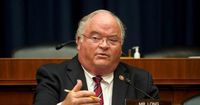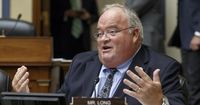In a dramatic shakeup that caught Washington insiders and IRS employees off guard, President Donald Trump has removed Billy Long as commissioner of the Internal Revenue Service (IRS) less than two months after his Senate confirmation. Treasury Secretary Scott Bessent has stepped in as acting commissioner, marking yet another leadership change at the embattled tax agency. The move, confirmed by multiple sources including The Hill, Reuters, and Scripps News, underscores the ongoing turbulence at one of the federal government’s most scrutinized institutions.
Billy Long, a former six-term Republican congressman from Missouri with a background as an auctioneer and real estate broker, was confirmed by the Senate in June 2025 in a narrow 53-44 party-line vote. All Democrats opposed his appointment, citing his lack of experience in tax administration and concerns over his past advocacy to abolish the IRS. Long had previously co-sponsored legislation to eliminate the agency he was tapped to lead. Before entering politics, he was well known as an auctioneer and talk radio host, but had never served on the tax-writing committee in Congress, according to The New York Times and NPR.
Long’s sudden departure came as a surprise, especially since he had only just begun implementing changes at the IRS. According to Bloomberg and USA TODAY, no official reason was given for his removal. However, sources familiar with the decision told The New York Times that Long had frustrated Treasury Department leaders by planning to start the next tax filing season around Presidents’ Day—about a month behind the usual schedule—and for preemptively announcing the elimination of the IRS’s Direct File program without Treasury’s approval.
In a statement provided by the White House, Long expressed gratitude for the opportunity to serve and enthusiasm for his next role. "It is a honor to serve my friend President Trump and I am excited to take on my new role as the ambassador to Iceland," Long said. "I am thrilled to answer his call to service and deeply committed to advancing his bold agenda. Exciting times ahead!" This sentiment was echoed in multiple outlets, including Reuters, NPR, and Scripps News. His appointment as ambassador to Iceland is expected to be formalized in the coming weeks.
The IRS has not had a stable leader since the start of Trump’s second term in January 2025. Long was the fifth person to hold the top job in less than eight months, with four others serving on an acting basis before him. The constant turnover has been linked to the administration’s aggressive cost-cutting campaign and broader efforts to reshape federal agencies. According to The Hill, the IRS’s taxpayer services division was expected to lose roughly 22 percent of its workforce by mid-2025. The Associated Press reported even more dramatic figures, with plans to cut 25 percent of all IRS staff and an 80 percent reduction in the Office of Civil Rights and Compliance.
Long’s tenure was also marked by controversy. Senate Democrats launched an inquiry into his promotion of a pandemic-era tax credit that had become notorious for fraudulent claims. During his confirmation hearing, Long faced tough questions about his role in promoting the credit, which critics said did not exist. He maintained his belief in its legitimacy, but the episode fueled partisan skepticism about his qualifications and motivations. As The New York Times reported, Long had also been paid by an oil and gas company to promote the tax credit, adding another layer of scrutiny to his brief leadership.
Beyond the leadership drama, the IRS itself is navigating a period of significant upheaval. The agency has laid off thousands of staffers in 2025, including nearly a third of its auditors, according to NPR. The IRS also struck a controversial deal to share confidential taxpayer information with immigration officials, a move that alarmed privacy advocates and some lawmakers. Meanwhile, the agency is preparing to implement sweeping changes to tax law following the passage of the GOP budget bill. Despite these challenges, acting commissioner Scott Bessent told Congress in June that the IRS collected more tax revenue in the spring of 2025 than it had the previous year, suggesting that core operations remain resilient amid the chaos.
President Trump’s decision to remove Long is part of a broader pattern of reshuffling financial regulatory agencies. He broke with tradition by not allowing former IRS Commissioner Danny Werfel, a Biden appointee, to serve out his full five-year term. Trump has also taken aim at the Consumer Financial Protection Bureau and the Federal Reserve, openly expressing frustration with their leadership and policies. On the same day as Long’s ouster, Trump signed an executive order aimed at punishing banks for “debanking” customers, and has mused about taking mortgage giants Fannie Mae and Freddie Mac out of government control.
The leadership churn at the IRS has not gone unnoticed in Congress. The top Democrats on the Senate Finance and House Ways and Means Committees, Sen. Ron Wyden of Oregon and Rep. Richard E. Neal of Massachusetts, were quick to criticize the administration’s approach. Wyden issued a blistering statement, saying, "In just a handful of months, Trump and his crew have already gutted taxpayer service, weaponized IRS data against innocent taxpayers and set us up for disaster when next year’s filing season comes around. This is what Trump does—pick incompetent, unserious people for serious jobs, and sit back as the damage piles up."
Not everyone in the tax community is panicking, however. Tax attorney and Republican strategist Rosemary Becchi told The Washington Post that, despite the leadership turmoil, "I do think that the tax community thinks there’s competent, capable people" still working at the agency. She added, "It’s a big job, and filing season is coming. They have got to get ready for the next filing season." Her comments reflect a cautious optimism among professionals that the agency’s career staff can maintain continuity even as political appointees come and go.
For now, the IRS finds itself once again in a state of flux, with Scott Bessent holding the reins as acting commissioner and a new ambassador to Iceland preparing for his next post. The coming months will test whether the agency can weather its latest storm and continue to fulfill its critical mission under intense political and operational pressure.


